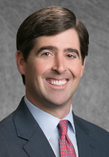© 2016 The Texas Lawbook.
By Natalie Posgate
(Nov. 17) – T. Boone Pickens is 88-years-old. His hearing and vision are poor. He tires quickly. The oil and gas mogul admits he’s made billions of dollars and lost billions of dollars.
But seated on a witness chair in a West Texas courtroom for two days last week, Pickens said several hundred million of those dollars he lost were actually stolen from him and he wants them back.

Pickens’ company, Mesa Petroleum Partners, accuses another legendary oil and gas name, J. Cleo Thompson, and three Midland-based energy firms of conspiring together to cheat him out of ownership interests and profits involving more than 160 leases to drill for oil in the “Red Bull” area of Reeves and Pecos counties.
Under oath, Pickens told jurors that the project with J. Cleo was “the biggest deal I was ever in.” He called his former business partners “crooks.”
“You stole the property, is what you did,” Pickens told the defendants with jurors watching.
Lawyers for J. Cleo and the three Midland exploration and production companies – Baytech, Delaware Basin Resources and Patriot Resources – reject Pickens’ claims and say they owe him nothing.
Defense attorneys argued that Pickens initially invested about $1 million in their acquisition project in 2007, but then he voluntarily waived his 15 percent stake in future acquisitions related to the project because he had lost $2 billion in the stock market crash in 2008 and 2009. They contend that Pickens actually called J. Cleo “Jimmie” Thompson Jr. in late 2008 to say he wanted out.
The defense’s theory is that Pickens filed the lawsuit in a frivolous attempt to make up money he lost from embarrassing financial losses during the Great Recession.
The case finishes its third week of trial Friday and might continue until after Thanksgiving.
So far, at least 17 witnesses have testified. But legal experts say the case could come down to one witness and one question: Do jurors believe Pickens is telling the truth?

“Jurors in complex business trials that feature an executive who is a dominant personality, such as Boone Pickens, often make their decision on whether they like or believe that executive,” said Joel Reese, a partner at Reese Gordon Marketos in Dallas, who is not involved in the litigation.
“If Pickens comes across strong, likeable and communicates a good message, it will resonate with jurors,” Reese said. “If the defense can portray Pickens as a wealthy bully or a liar and unlikeable, then the defense will probably win.”
During his two days on the witness stand, Pickens told the jurors that he didn’t know he “was dealing with a crook” when he signed a “participation agreement” with J. Cleo Thompson and Baytech nearly a decade ago to acquire and drill wells in oil-rich Reeves and Pecos counties.
“Of all the wells I drilled, this actually turned out to be the biggest prospect that I’ve ever been involved in,” Pickens told jurors. “The biggest deal I was ever in and I had it taken away from me.”

Chrysta Castañeda, who is Mesa’s lead lawyer, asked Pickens how he felt when his relationship with Baytech and J. Cleo Thompson went south.
“It’s an experience I’ve never had in the business in 62 years, that I went into a deal and thought everybody in it was honest,” Pickens said. “And I found out so much more after I got into it and, [during] discovery… how dishonest they were.”
Mesa’s lawyers argue that Baytech and J. Cleo Thompson were required under the contract to offer Mesa all opportunities to participate in every interest that was acquired in the Red Bull area between 2007 and 2012.
“We participated in everything,” Pickens testified. “We paid our part in everything that was offered.”
During cross-examination, lawyers for the defense grilled Pickens about numerous documents and refund checks allegedly showing that Mesa Petroleum knew it had opted out of the project as a partner.
“Have you ever known a crook to try and give you your money back?” Gardere partner Geoff Bracken, who represents J. Cleo Thompson, asked Pickens.
“I haven’t had a lot of dealings with crooks,” Pickens responded. “Not as many as you have probably.”
Tim McConn, a lawyer representing Baytech and DBR, showed Pickens and jurors a letter from the president of the two companies to a Mesa executive seeking confirmation that Pickens’ company was opting out the agreement.

“So not once, but twice, in this letter on March 2, 2009, the people who you say were hiding things from you are telling you exactly what they think is going on, that you have opted out, correct?” McConn, a partner at Yetter Coleman in Houston, asked Pickens.
“They are writing this, but I do not know what ‘opt-out’ means,” Pickens replied. “I never opted out of anything. You keep throwing it up to me.”
McConn asked Pickens if he and his team at energy-focused hedge fund BP Capital were “looking to cut costs” and get out of the Red Bull investment in 2008 when oil prices and the stock market crashed, causing Pickens’ net worth to plummet by $2 billion, or 70 percent
“Costs had already been cut,” Pickens answered. “No, we operate very efficiently. And a billion dollars net worth allows you do to a lot of things.”
McConn then read to Pickens and jurors previous testimony by Pickens in a deposition.
McConn: Generally speaking, how did that drop in those commodity prices in late 2008 impact your fund, BP Capital, and the investments you had with them?
Pickens: We lost a lot of money.
McConn: And were you going through any process at that point in, say, November, December, to try to figure out, maybe to reevaluate, your assets and your investments?
Pickens: Oh, sure. We lost a lot of money, and we were reevaluating assets all over the place.
McConn: And were you looking for ways possibly to cut costs where they weren’t maybe necessary giving potential upside?
Pickens: We did cut costs.
Pickens, however, painted a different picture when he was questioned by Castañeda about the allegation that he got out of the Red Bull because he needed his money back.
“Yeah, I wanted to get my money back,” he said. “There were also comments made that I didn’t have enough money to do this. I had hit a high-water mark of $4 billion in net worth, and I gave away $1 billion, lost $2 billion, and still had $1 billion left at this point. I gave $1 billion to MD Anderson Hospital, UT Southwestern, Scottish Rite Hospital, Children’s Hospital, Baylor Hospital. And that money had been given away.
“Fine. I still had a billion dollars,” he continued. “I could have financed their whole deal here that they had. If they had just sat down and talked to me about it, I [would have been] more than happy to look at the whole deal.”
Pickens denied claims by officials at J. Cleo Thompson and Baytech that Pickens called J. Cleo “Jimmie” Thompson, who died in 2010, and J. Cleo’s chief financial officer, Cliff Milford, to say he was “out” of the Red Bull project.
“I never had a telephone conversation with Thompson about the Red Bull,” Pickens said. “There was never any reason for us to have a conversation. And consequently, I didn’t. So we’ve checked our telephone records completely, and we have no record of a telephone conversation with Thompson.”

Pickens admitted on cross-examination by Bracken that he and his secretary did not keep records on his outgoing phone calls, which was an important admission because the defense claims it was Pickens who called Thompson.
Reese, the independent lawyer not involved in the case, said the debate over the phone call demonstrates why Pickens’ testimony is decisive.
“The fact that this case may come down to whether a phone call occurred between an 88-year-old man and a dead man rests on whether jurors believe or do not believe Boone Pickens,” he said. “If jurors believe Pickens, he probably wins hundreds of millions of dollars. If they don’t, he probably gets nothing.”
© 2016 The Texas Lawbook. Content of The Texas Lawbook is controlled and protected by specific licensing agreements with our subscribers and under federal copyright laws. Any distribution of this content without the consent of The Texas Lawbook is prohibited.
If you see any inaccuracy in any article in The Texas Lawbook, please contact us. Our goal is content that is 100% true and accurate. Thank you.
